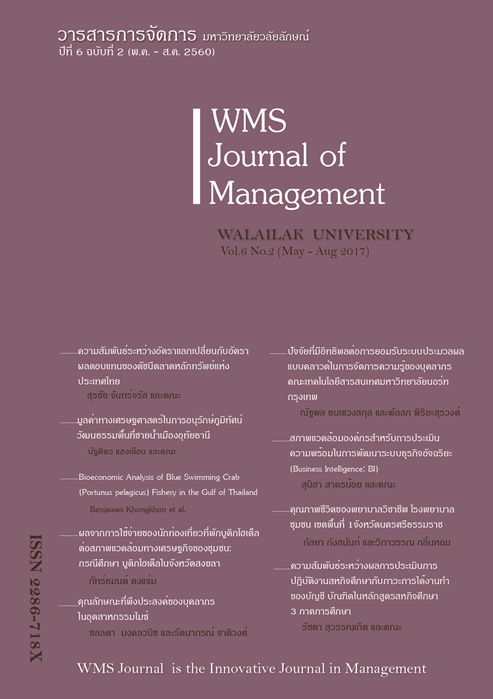Desirable Attributes of Personnel in the MICE Industry
Main Article Content
Abstract
The purpose of this research was 1) to examine desirable attributes of personnel in the MICE industry 2) to examine job positions lacking in the MICE industry and 3) develop a guideline of desirable attributes of personnel in accordance with the needs of the labor market. The sample size of this research was 105 entrepreneurs related to the MICE industry. The data was collected by using questionnaires and the data was analyzed using frequency, percentage and standard deviation (S.D.). The inferential statistics for the hypothesis test were T-test and F-test.
The research revealed that the opinions of entrepreneurs of present personnel were overall high, especially in terms of honesty, readiness and willingness to serve. The most important attributes of personnel in the MICE industry are the readiness and willingness to serve, honesty, courteousness and being service minded respectively. The most required job positions in the MICE industry are sales personnel, who truly understand MICE industry are skillful in sales and negotiation. They must also be able to communicate well in English and possess good social skills. Event managers and creative designers are also in high demand, albeit slightly less so than sales personnel. Therefore, the guideline for developing attributes of personnel in the MICE industry should focus on training in foreign languages, service minded development and technological skills.Article Details
References
กฤษดา ปิติกุลตัว และอลงกต วัชรสินห์. (2552).ปัญหาและแนวทางการแก้ไขปัญหาของการให้บริการการจัดประชุมและสัมมนาของธุรกิจโรงแรมและรีสอร์ทในอำเภอขนอม จังหวัดครศรีธรรมราช.การศึกษาอิสระบริหารธุรกิจมหาบัณฑิต, สาขาการจัดประชุมธุรกิจโรงแรม.วิทยาลัยดุสิตธานี.
กรมการท่องเที่ยว กระทรวงการท่องเที่ยวและกีฬา.(2555). คู่มือการพัฒนาบุคลากรด้านการท่องเที่ยว. กรุงเทพฯ.
กิตรัตน์ พิมพาภรณ์. (2557). การพัฒนาบุคลิกภาพ สำหรับผู้ใช้บริการในธุรกิจ โรงแรมและท่องเที่ยว. กรุงเทพฯ: ท้อป.
เกิดศิริ เจริญวิศาล. (2552). รูปแบบการตลาดที่เหมาะสมของสถานที่จัดงาน สำหรับ อุตสาหกรรมไมซ์ในประเทศไทย. เชียงใหม่: มหาวิทยาลัยแม่โจ้.
ฉัฐชสรณ์ กาญจนศิลานนท์. (2551). แนวทางการพัฒนาบุคลากรในงานโรงแรม: กรณีศึกษาโรงแรมระดับ 3 ดาว ใน กรุงเทพมหานคร. กรุงเทพฯ : มหาวิทยาลัยศรีปทุม.
บุญเลิศ จิตตั้งวัฒนา. (2557). ธุรกิจไมซ์. พิมพ์ครั้งที่ 2. กรุงเทพฯ: เฟริ์นข้าหลวงพริ้นติ้งแอนด์พับลิชชิ่ง.
รริรธร วะทา. (2553). ปัจจัยที่มีผลต่อความสามารถในการแข่งขันของประเทศไทย ในการเป็นจุดมุ่งหมายปลายทางของอุตสาหกรรมการแสดงสินค้าและนิทรรศการนานาชาติในเอเชีย. วิทยานิพนธ์เศรษฐศาสตรมหาบัณฑิต, จุฬาลงกรณ์มหาวิทยาลัย.
วาโร เพ็งสวัสดิ์. (2551). วิธีวิทยาการวิจัย. กรุงเทพฯ: สุวิริยาสาส์น.
วิโรจน์ ระจิตดำรงค์. (2554). ความพร้อมด้านบุคลากรของศูนย์ประชุมในเขตกรุงเทพ มหานครและปริมณฑลต่อการรองรับงานในอุตสาหกรรมไมซ์ (MICE). การศึกษาค้นคว้าด้วยตนเอง ปริญญาศิลปะศาสตรมหาบัณฑิต, สาขาวิชาการจัดการโรงแรมและการท่องเที่ยว มหาวิทยาลัยนเรศวร.
วัชราภรณ์ สุรภี. (2556). ความต้องการสมรรถนะของบุคลากรในอุตสาหกรรมการจัด ประชุมนิทรรศการ และการท่องเที่ยวเพื่อเป็นรางวัลของประเทศไทย. วิทยานิพนธ์ปริญญาศิลปศาสตรมหาบัณฑิต, สาขาวิชาการจัดการโรงแรมและการท่องเที่ยว มหาวิทยาลัยนเรศวร.
สำนักงานเศรษฐกิจอุตสาหกรรมระหว่างประเทศ.(2554). ประชาคมอาเซียน (ASEAN Economic Community: AEC). กรุงเทพฯ: สำนักเศรษฐกิจอุตสาหกรรมระหว่างประเทศ.
International Congress and Convention Association. (2013). ICCA Statistics Report 2013. [online] Retrieves from http://www.iccaworld.com [August 1, 2015]
Pacific Asia travel Association. (2011). MICE come of age in Asia Pacific. Issues & Trends, 16(3), 1-2.
Thailand Convention and Exhibition Bureau (TCEB). (2014). Thailand’s MICE Industry Report 2014. Bangkok.
Thailand Convention and Exhibition Bureau (TCEB). (2011). Introduction to MICE Industry. Bangkok.
Thailand Convention and Exhibition Bureau (TCEB). (2015). Thailand’s MICE Industry Report 2015. Bangkok.


